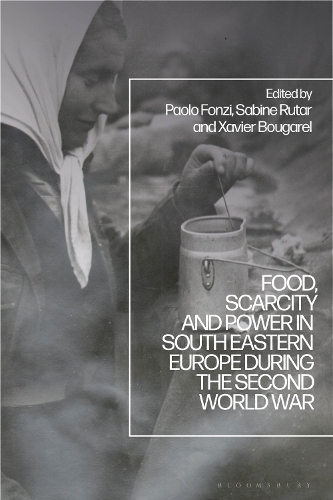
Food, Scarcity and Power in Southeastern Europe during the Second World War
(Paperback)
Available Formats
Publishing Details
Food, Scarcity and Power in Southeastern Europe during the Second World War
By (Author) Paolo Fonzi
Edited by Sabine Rutar
Edited by Xavier Bougarel
Bloomsbury Publishing PLC
Bloomsbury Academic
30th April 2026
United Kingdom
Classifications
Professional and Scholarly
Non Fiction
European history
Second World War
Social and cultural history
Physical Properties
Paperback
272
Width 156mm, Height 234mm
Description
The experience of all occupied countries during the Second World War was characterised by severe material shortages. Food, most noticeably, became a scarcity in everyday life; and that food grew into a major stake for all political groups at this time. This book shines a much-needed spotlight on the political role of food in Southeastern Europe from 1939 to 1945.
Controlling food was a key strategy adopted by all actors be they occupiers, state institutions, resistance organizations, international humanitarian organizations or private interest groups in substantiating their bid for power. As a predominantly agrarian area with a substantial peasant population, investigating this topic is particularly poignant for Southeastern Europe. From discussions of searching for and fighting for food to offering relief and instrumentalising of food politically, the chapters in this volume add nuance to discussions on the complex intertwined political and social dynamics of war and occupation. In so doing, this sophisticated study fills an important gap in our understanding of the Second World War, food policy, and the social history of Europe more broadly.
Reviews
Masterfully researched and impressively detailed, Food, Scarcity and Power in Southeastern Europe During the Second World War, reveals the intimate and far-reaching impacts that high-level Axis decision-making had on the everyday lives of ordinary people. A stunning illustration of the boundless reach of World War II into the daily lives of so many. * Dr. Jacob Flaws, Assistant Teaching Professor and World War II Studies Masters Program Lead, Arizona State University, USA *
Author Bio
Paolo Fonzi is Assistant Professor in Contemporary History at University of Eastern Piedmont, Italy.
Sabine Rutar is Senior Research Associate at the Leibniz Institute for East and Southeast European Studies, Germany.
Xavier Bougarel is CNRS Researcher at CETOBAC, the Center for Turkish, Ottoman, Balkan and Central Asian Studies, France.
